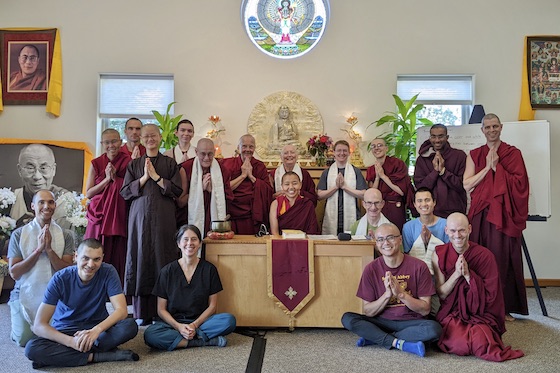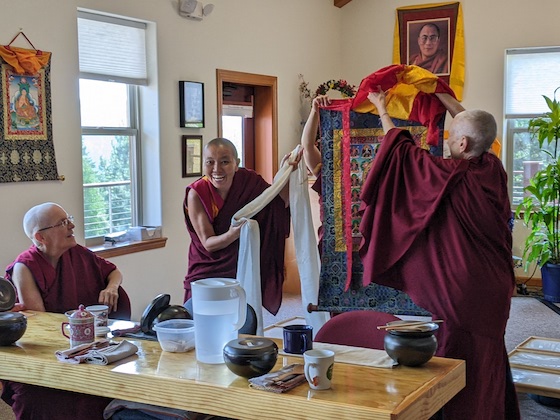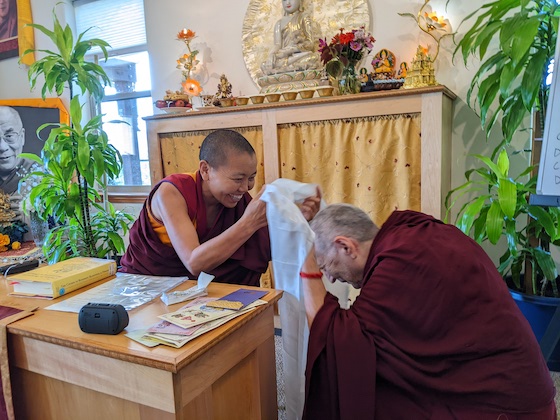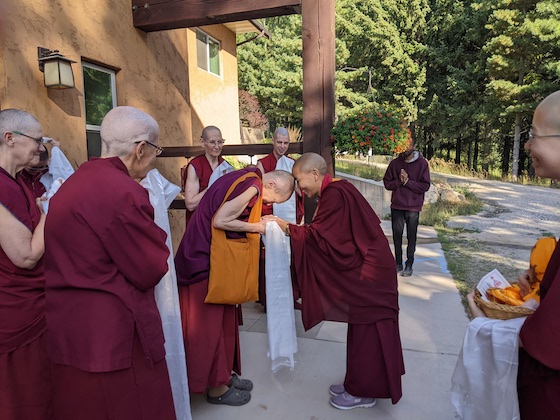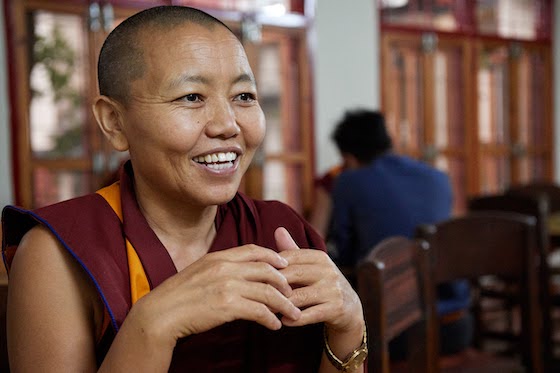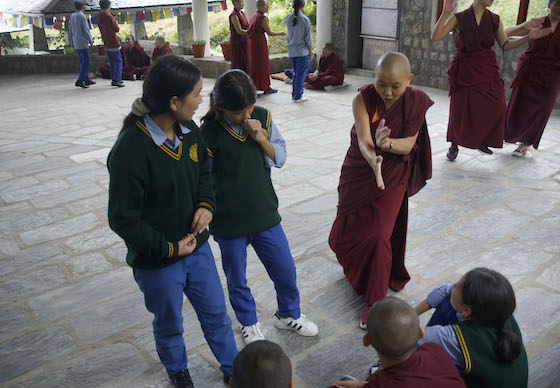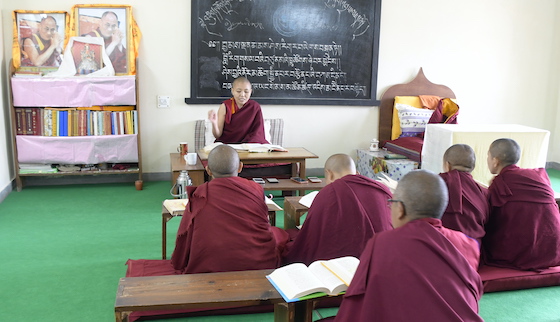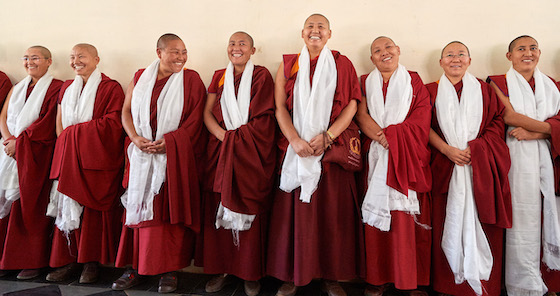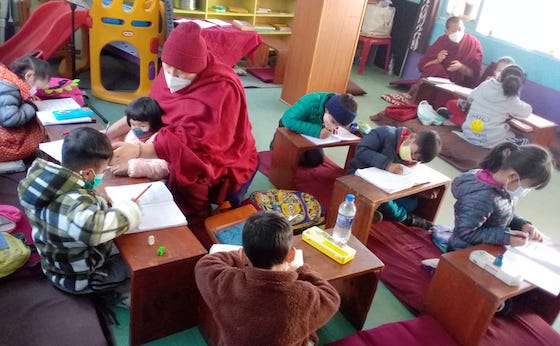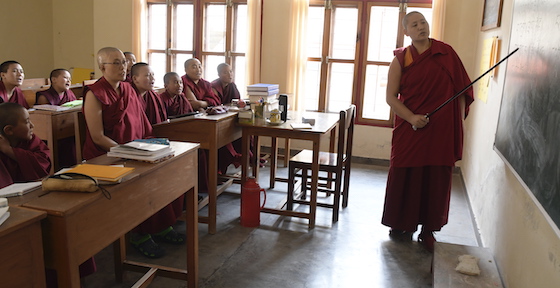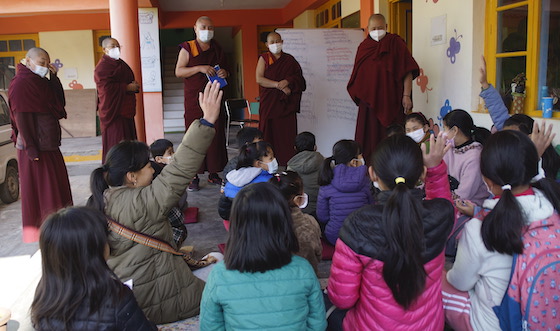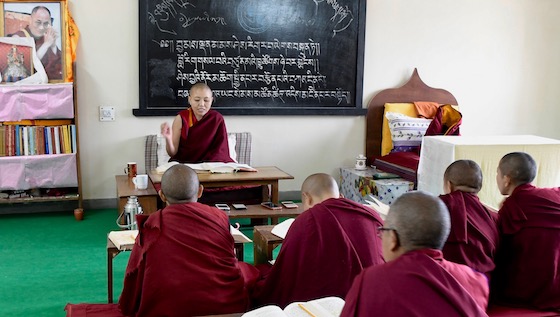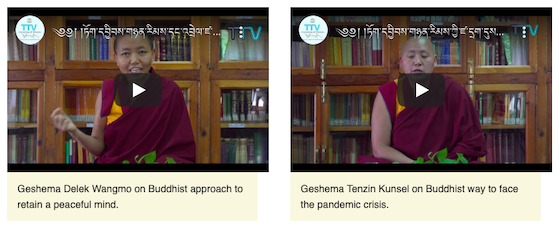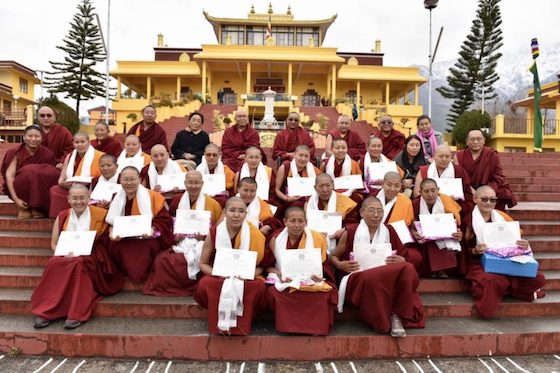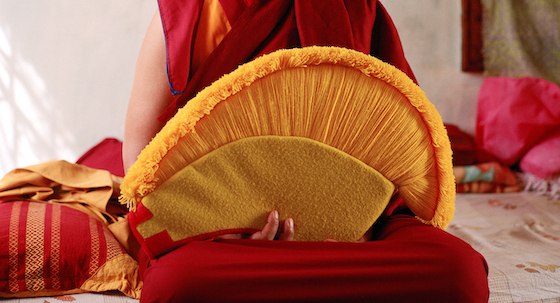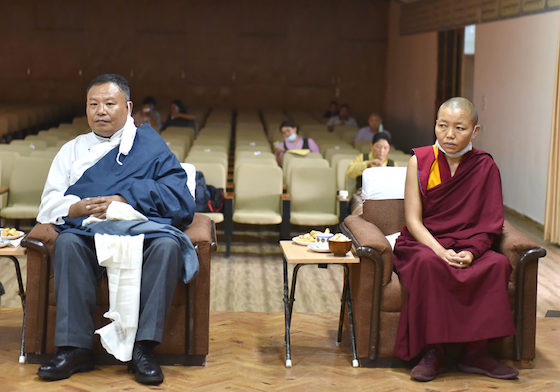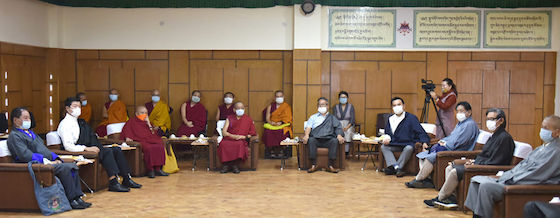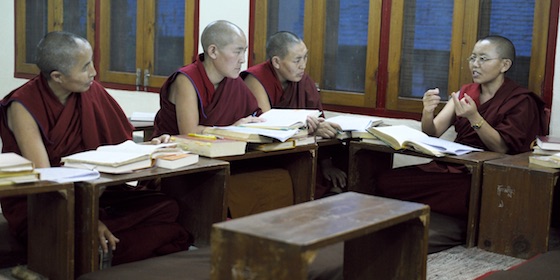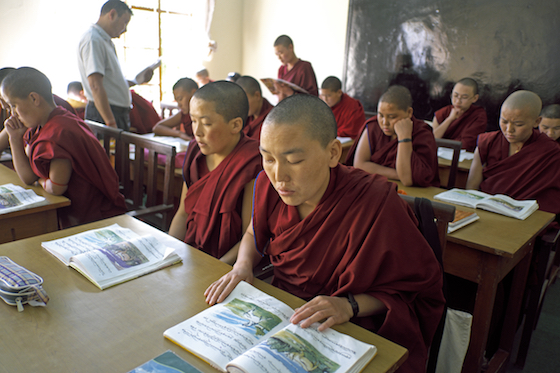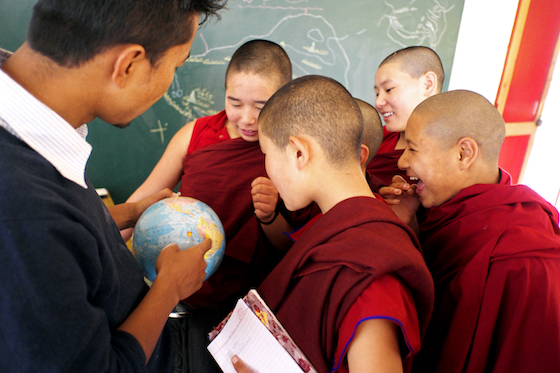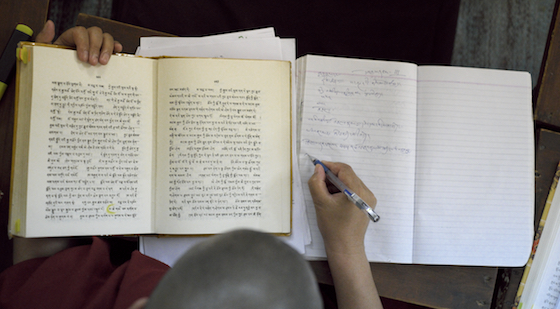Change from Male Principal to Leadership by the Nuns
On April 17, 2025, the nuns celebrated big changes in the leadership at Dolma Ling Nunnery and Institute. For the first time since the nunnery was inaugurated 20 years ago, Dolma Ling has transitioned from having a male principal to leadership by the nuns themselves.
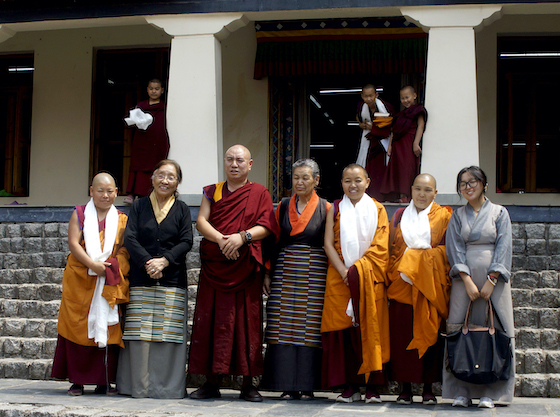
Three Tibetan Buddhist nuns have taken on the leadership of Dolma Ling Nunnery. From left to right: Venerable Ngawang Palmo, Rinchen Khando Choegyal (TNP’s Founding Director and Special Advisor), the former principal who is stepping down, Nangsa Choedon (Director of the Tibetan Nuns Project in India), Geshema Delek Wangmo (new principal), Geshema Tenzin Dolma, Tenzin Palkyi (Assistant Director, TNP India).
In a change that reflects a shift toward a more collective approach to leadership, responsibilities will be divided between three nuns instead of having one principal. The leadership terms will last three years. After that, the Tibetan Nuns Project and the Nuns’ Committee will decide if they want to keep the nomination process or switch to an election system.
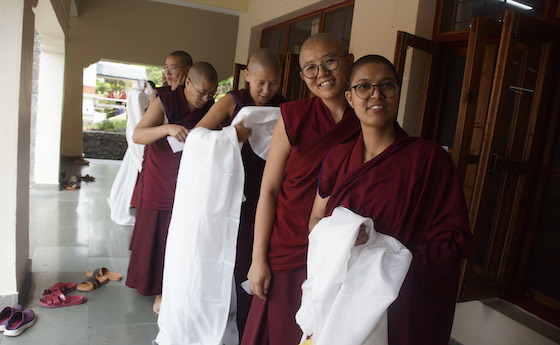
Tibetan Buddhist nuns gather outside the prayer hall at Dolma Ling carrying kataks, traditional Tibetan ceremonial scarves that they will offer the three nunnery leaders as a sign of respect and congratulations.
For the academic side, Geshema Delek Wangmo will take on the role of the nunnery’s principal, handling all academic matters. Two other nuns, Venerable Ngawang Palmo and Geshema Tenzin Dolma, will share the responsibility for the administration of the nunnery.
The Three Nuns Taking on the Leadership
“It is so inspiring to see the nuns taking on the leadership of Dolma Ling and becoming even further role models for their community,” says Lisa Farmer, Executive Director of the Tibetan Nuns Project. “We are so grateful to our supporters for their kindness and generosity. Our work would not be possible without their dedication to the nuns.”
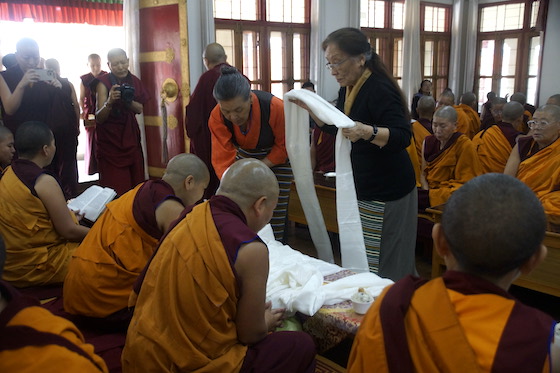
Rinchen Khando Choegyal (right), TNP’s Founding Director and Special Advisor, and Nangsa Choedon, Director of the Tibetan Nuns Project in India, present kataks to the leaders of the nunnery at a special celebration on April 17, 2025.
Dolma Ling Nunnery and Institute of Buddhist Dialectics is a non-sectarian nunnery located in the Kangra valley near Dharamsala, northern India. The large campus is currently home to about 300 nuns. It is one of two nunneries built and fully supported by the Tibetan Nuns Project. Here are brief biographies of the three nuns now leading the nunnery.
Principal Geshema Delek Wangmo
Geshema Delek Wangmo’s journey to become a principal, Geshema, teacher, and a role model has been long and arduous. Her remarkable life story exemplifies resilience, determination, and a deep commitment to spiritual growth, inspiring others on their paths to enlightenment.
Born in 1970 in Litang in the Kham region of eastern Tibet, Delek Wangmo was ordained at 15 with Tenzin Delek Rinpoche. Her village, Detsa, did not have a school and she spent most of her time tending animals with her nomadic family.
When she was 19, Tenzin Delek Rinpoche led her and other nuns on an 18-month, 950-mile pilgrimage from their home province to Lhasa with the group prostrating the entire way. She began learning the Tibetan alphabet on the pilgrimage. After escaping from Tibet in 1990, she and other nuns lived in a rental house funded by the Tibetan Nuns Project, studying in the early morning and late evening while actively participating in the construction of their new nunnery, Dolma Ling.
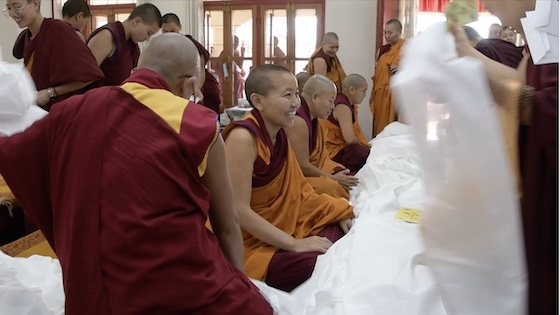
Geshema Delek Wangmo, the new principal of Dolma Ling, being offered Tibetan ceremonial scarves as a act of respect and congratulations. She was virtually illiterate when she escaped from Tibet and now holds the highest degree in her tradition. Photo by the Dolma Ling Media Nuns.
After years of study, Delek Wangmo earned her Geshema degree in 2017. She then became part of the first group of nuns allowed to study at Gyuto Tantric University, also a part of the traditional education for monks. After completing her education, Geshema Delek Wangmo became a philosophy teacher at Dolma Ling Nunnery and Institute in 2019. In 2020, she was appointed as an election commissioner by the Tibetan Parliament-in-Exile. You can read more of her remarkable story here.
Venerable Ngawang Palmo
Venerable Ngawang Palmo knew from the time she was little that she wanted to be a nun. She and her friends used to pretend to teach each other scriptures when they were playing. She was born in 1975 to a farming family in Central Tibet. She had some opportunities for education in Tibet. At age 7, she went to school for three months a year and began learning Tibetan, but the 9-month gaps in learning made it hard to progress.
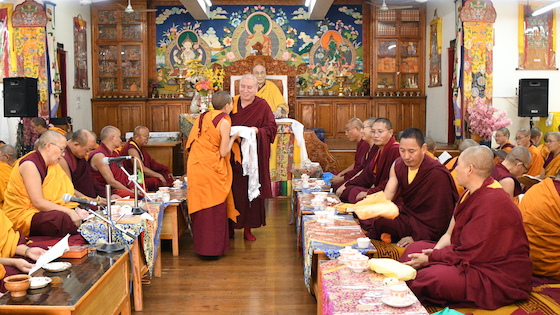
On April 17, 2025, the nuns and special guests gathered in the prayer hall at Dolma Ling to celebrate the nuns taking on the leadership of the nunnery. Photo by the Dolma Ling Media Nuns.
At 13, she became ordained as a nun and lived at Gari Nunnery until 1992. However, because of Chinese restrictions, she received no proper and systematic education there. Moreover, after some of the Gari nuns celebrated His Holiness the Dalai Lama’s Nobel Peace Prize in 1989, Chinese authorities arrested and expelled many nuns. In 1992, Ngawang Palmo escaped on foot from Tibet seeking education and the freedom to practice her religion.
Venerable Ngawang Palmo brings a wealth of experience to her new role. In addition to her years of studies, she has held many administrative positions at Dolma Ling, including as librarian and treasurer. She served in the Changdzö office, which is responsible for the nunnery’s finances and property. The Changdzö nuns have several duties. They receive and distribute offering money. They also run the nunnery store and make purchases for the nunnery. Venerable Ngawang Palmo was one of seven nuns on the Administration Committee overseeing major decisions for the institution.
Geshema Tenzin Dolma
Geshema Tenzin Dolma was born in Kinnaur, a small village in the Indian Himalayas. Her family were farmers and she spent a lot of time working in the fields and helping her mother at home. There was a nearby Indian government school. However, her school life was brief. She attended primary school until Grade 5, then dropped out to help her family.
After a nun from Dolma Ling came to her village for holidays, Tenzin Dolma decided to become a nun and pursue her education. She became a nun at 18 and came to Dharamsala, joining Dolma Ling first as a day student before she got full admission in 1999. She found the early days challenging because she couldn’t read and write Tibetan, and she struggled to learn the alphabet. Also, the temporary living conditions for the nuns were difficult. She recalled, “During those days, Dolma Ling Nunnery was under construction and we had to help the builders most of the days. We didn’t even have a proper kitchen and we didn’t use gas. We had to go out to find wood for cooking.”

When Tenzin Dolma joined Dolma Ling as a day student in 1998, the nunnery was under construction. Here’s an archival photo of a nun holding a paper model of the nunnery in front of the construction site. Thanks to your support, Dolma Ling is now a thriving educational center.
Tenzin Dolma worked hard and excelled. She earned her Geshema degree, equal to a PhD in Tibetan Buddhist philosophy, in 2017. She was one of the second group of nuns to achieve this. Like Principal Geshema Delek Wangmo, in 2019 she completed a year-long course in Tantric Studies at Gyuto Tantric Monastery. This groundbreaking program funded by Tibetan Nuns Project donors provides dedicated senior nuns training in tantric theory, rituals, and mind-training techniques used by those engaged in advanced meditation.
“I have learned lots of new things at Dolma Ling. I think to myself that if I were in my village, I would have missed all these opportunities to develop myself and find a meaning and value of life.” Geshema Tenzin Dolma is very grateful to the supporters of the Tibetan Nuns Project and to Dolma Ling.
About Dolma Ling
Dolma Ling Nunnery and Institute of Buddhist Dialectics is a non-sectarian nunnery near Dharamsala, northern India. The large campus is now home to about 300 nuns.
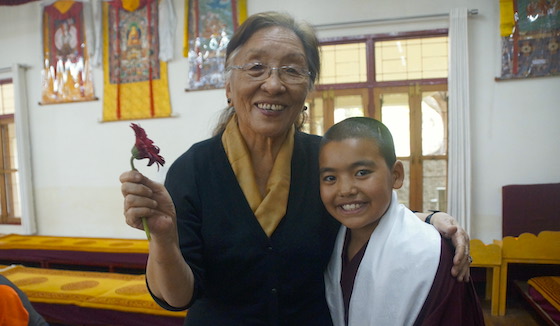
Rinchen Khando Choegyal, the Tibetan Nuns Project’s Founding Director and Special Advisor, with a nun at Dolma Ling at the celebration on April 17th.
Officially inaugurated by His Holiness the Dalai Lama on December 8, 2005, the nunnery is fully funded by the Tibetan Nuns Project and was the first institute dedicated specifically to higher Buddhist education for Tibetan Buddhist nuns from all traditions.
Dolma Ling is unique because it offers a 17-year curriculum of traditional Buddhist philosophy and debate, as well as modern courses in Tibetan language, English, basic mathematics, and computer skills. The nuns also receive training in the ritual arts such as sand mandalas and butter sculpture. The nunnery was completed after 12 years of hard work. The nuns helped to build the nunnery and work diligently to maintain it.
For the first nuns who fled to India, such academic and leadership successes would have seemed almost impossible. Almost all the nuns who arrived as refugees had received no formal education. Many could not even write their names.
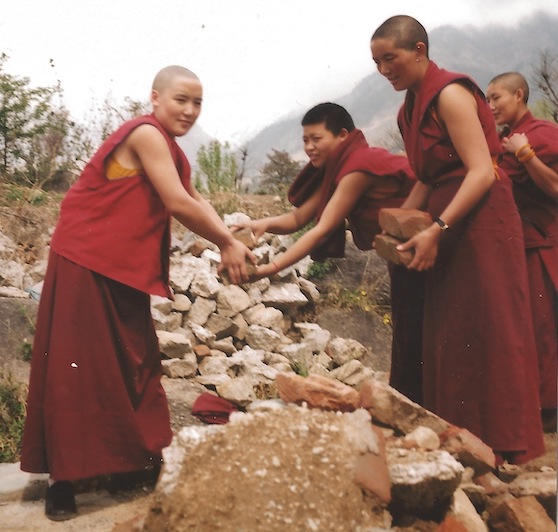
Tibetan Buddhist nuns in India building Dolma Ling. Photo by Jessica Tampas.
When the nuns arrived in India, they were ill, exhausted, traumatized and impoverished. Many nuns had faced torture and imprisonment at the hands of the Chinese authorities in Tibet and endured immense physical and emotional pain. The existing nunneries in the struggling Tibetan refugee community in India were already overcrowded and could not accommodate them.
The Tibetan Nuns Project, with your support, had to focus on the basics of education. This included setting up classes, building a curriculum, ensuring regular attendance, and administering tests. Those who have always had access to education might take these systems for granted. However, for the nuns, every part of an education system had to be established from scratch.
The new academic year began at Dolma Ling on March 17, 2025. In April, we launched a project to help build special housing for elder nuns. The Tibetan Nuns Project has set up a Long-Term Stability Fund to support our main programs. These include education, food, shelter, clothing, and basic medical care for the nuns.


